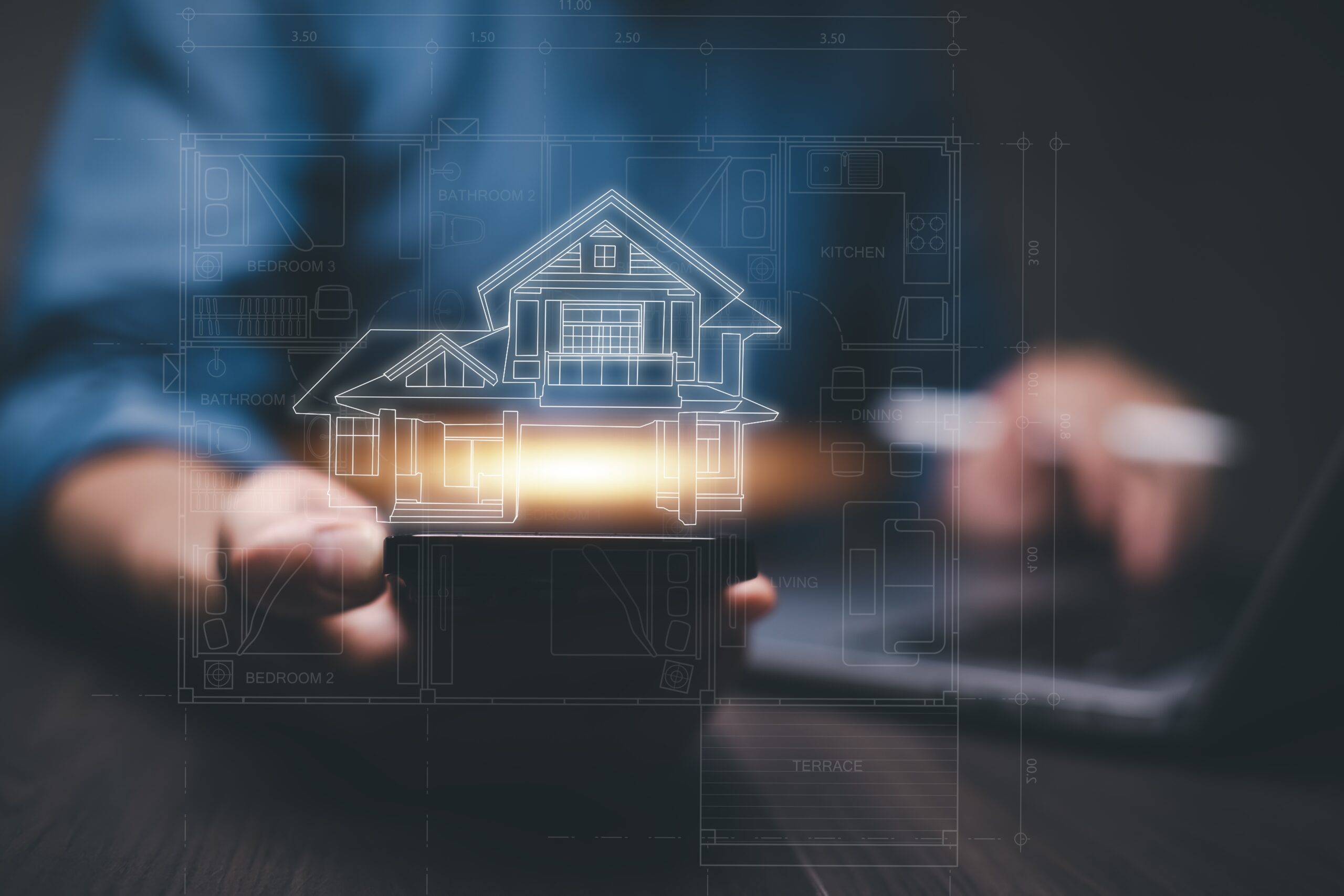In today’s fast-paced world, technology is revolutionizing every industry, and real estate is no exception. The integration of advanced technologies is not only streamlining processes but also enhancing the overall client experience. At Dickson Realty, we harness the power of innovation to help you achieve your homeownership goals efficiently and effectively.
The Evolution of Real Estate Technology
Over the years, real estate technology has advanced significantly, transitioning from basic online listings to sophisticated digital platforms that offer immersive experiences and comprehensive data. Early innovations like the Multiple Listing Service (MLS) were instrumental in making property information widely accessible. These early systems laid the groundwork for today’s advanced tools, which provide real-time data, virtual tours, and AI-driven insights.
As Beau Keenan, CEO of Dickson Realty, highlights, “Technology has transformed the real estate landscape, making it more accessible and transparent for clients.” This transformation has revolutionized the industry by enhancing transparency and efficiency. Buyers and sellers now have access to comprehensive data and insights that enable more informed decisions.
For instance, the development of online MLS systems allowed buyers to view properties remotely, greatly expanding the market reach for sellers and giving buyers a broad range of options. Furthermore, the introduction of electronic signatures and online document storage has streamlined the paperwork process, significantly reducing the time and effort needed to complete transactions. These advancements have made real estate transactions faster, more secure, and more convenient for all parties involved.
Key Technologies Enhancing the Homeownership Experience
Virtual Tours and Augmented Reality (AR)
Virtual tours and augmented reality (AR) have become indispensable tools in the real estate industry, offering potential buyers the ability to explore properties from anywhere in the world. This immersive technology allows for detailed, 360-degree views of properties, enabling buyers to navigate through rooms and gain a realistic sense of space and layout. AR enhances these virtual tours by superimposing information and interactive elements on real-world views, providing additional details such as floor plans and renovation possibilities.
In today’s market, where remote viewings have become increasingly common, these technologies offer significant convenience and time savings. Buyers can view multiple properties in a short period without the need for physical visits, and sellers can reach a wider audience without the logistical challenges of traditional open houses. This is particularly beneficial for out-of-town buyers or those with busy schedules, allowing them to make more informed decisions quickly.
For sellers, virtual tours and AR expand the potential buyer pool, making it easier to market properties to a global audience. By providing an immersive and interactive experience, these technologies can highlight a property’s best features and make it stand out in a competitive market. This not only attracts more interest but can also lead to quicker sales and potentially higher offers.
The integration of virtual tours and AR into real estate marketing strategies exemplifies how technology is transforming the industry, enhancing the experience for both buyers and sellers and making the process more efficient and effective.
Artificial Intelligence (AI) and Big Data
Artificial Intelligence (AI) and big data analytics are revolutionizing the real estate industry by offering powerful tools to understand market trends and consumer preferences. These technologies enable real estate professionals to provide personalized recommendations and predictive analytics, significantly enhancing the efficiency of the buying and selling process.
AI algorithms can analyze vast amounts of data to identify trends and patterns, helping agents forecast market conditions and accurately price properties. By leveraging big data, agents can predict market trends, identify potential buyers, and tailor marketing strategies to individual preferences, leading to better outcomes for both buyers and sellers. This targeted approach increases the likelihood of successful transactions by reaching the right audience with the right message.
Moreover, AI and big data provide valuable insights that improve decision-making. For example, predictive analytics can help identify the best times to buy or sell, optimize property listings, and anticipate market shifts. This level of precision allows for a more strategic approach to real estate, ultimately benefiting clients by ensuring they make informed decisions based on comprehensive data analysis.
Blockchain
Blockchain technology is transforming real estate transactions by ensuring transparency and security. This decentralized ledger system reduces the risk of fraud and streamlines the closing process, making transactions more efficient and trustworthy.
Blockchain’s transparency and security features are crucial in reducing fraud and increasing trust in real estate transactions. By creating an immutable record of transactions accessible to all parties, blockchain ensures that every transaction is transparent and verifiable. This reduces the risk of fraud and builds confidence among buyers and sellers.
Furthermore, blockchain technology speeds up the closing process by eliminating the need for intermediaries and reducing paperwork. Smart contracts, a key feature of blockchain, automatically execute terms when predefined conditions are met. This automation streamlines the closing process, ensuring that all parties adhere to the agreed terms without delays.
Smart Home Technology
Smart home technology is increasingly in demand, offering features such as automated lighting, security systems, and energy-efficient appliances. These technologies enhance convenience, add value to properties, and contribute to energy savings, making homes more appealing to buyers.
Smart home devices can automate lighting, heating, and security systems, providing homeowners with control and convenience through mobile apps or voice commands. This level of automation increases the appeal of properties by offering enhanced security and ease of use.
Moreover, smart home technology can lead to cost savings for homeowners through reduced energy consumption and improved home management. Energy-efficient appliances and automated systems help lower utility bills, making homes more cost-effective to maintain. Integrating these technologies into a central system allows for seamless control and monitoring of various aspects of the home, providing a cohesive and efficient living environment.
By incorporating smart home features, properties not only become more attractive to potential buyers but also offer practical benefits that enhance the overall quality of life. This technological advancement underscores the ongoing evolution of real estate, where innovation continues to drive improvements in convenience, security, and efficiency.
How Technology Benefits Home Buyers
Enhanced Search Experience
Advanced search tools on real estate platforms have revolutionized the home-buying process by allowing buyers to filter properties based on specific criteria such as location, price, and amenities. This targeted search capability makes it easier for buyers to find homes that meet their exact needs, leading to a more efficient and satisfying home search experience.
Real estate platforms offer various filters for property attributes, enabling buyers to customize their search and view only the most relevant listings. Additionally, these platforms provide real-time updates on new listings, price changes, and market trends, ensuring buyers stay informed and don’t miss out on potential opportunities. This technological advancement not only saves time but also helps buyers focus their efforts on properties that truly match their preferences.
Access to Comprehensive Information
Technology has made detailed property information more accessible than ever. Buyers can now access virtual tours, neighborhood data, and market trends, which collectively provide a transparent and complete picture of the property and its surroundings.
This comprehensive information empowers buyers to make well-informed decisions, reducing uncertainty and increasing buyer confidence. Listings often include high-quality photos and virtual tours, offering a thorough understanding of the property’s condition and layout. Furthermore, real estate platforms provide data on schools, crime rates, amenities, and local market trends, helping buyers assess the suitability of a location based on their personal and family needs.
Seamless Communication
Technological advancements have also facilitated seamless communication between buyers, agents, and sellers. Tools such as video conferencing, instant messaging, and e-signatures have made the process more efficient and convenient.
Efficient communication is key to speeding up transactions, reducing misunderstandings, and ensuring that all parties are on the same page. Platforms like Zoom and Skype enable virtual meetings and property tours, making it easier for buyers to connect with agents and sellers without the need for physical presence. Tools like DocuSign allow for secure and convenient signing of documents, further expediting the process and minimizing the need for in-person meetings.
How Technology Benefits Home Sellers
Increased Visibility
Digital marketing strategies, including social media advertising and search engine optimization (SEO), have greatly enhanced the visibility of properties. High-quality photos and virtual tours attract more potential buyers, often leading to quicker sales.
Reaching a broader audience increases the chances of finding the right buyer quickly, reducing the time the property stays on the market and potentially leading to higher offers. Targeted ads on platforms like Facebook and Instagram can reach potential buyers based on specific demographics, interests, and behaviors. Additionally, optimizing listings for search engines ensures they appear in relevant searches, increasing organic traffic to the property listing.
Data-Driven Pricing Strategies
AI and big data provide critical insights into market trends and buyer behavior, helping sellers set competitive prices. According to Beau Keenan, CEO of Dickson Realty, “Accurate pricing is crucial for a successful sale. Leveraging data ensures we set the right price to attract serious buyers.”
Accurate pricing attracts serious buyers and can lead to quicker sales. Overpricing can deter potential buyers while underpricing can leave money on the table. AI algorithms analyze comparable sales, market conditions, and property features to suggest an optimal listing price. These data-driven tools can also adjust pricing based on market changes, demand fluctuations, and feedback from showings, ensuring that the property remains competitively priced throughout the selling process.
Streamlined Transactions
Technology has streamlined the entire transaction process, from listing to closing. E-signatures, online document storage, and digital payment systems make it easier to manage paperwork and complete transactions efficiently.
Reducing the complexity and time required for transactions benefits both sellers and buyers, leading to a smoother and faster closing process. Tools like DocuSign and Adobe Sign enable secure digital signing of contracts, eliminating the need for in-person meetings. Platforms like Dropbox and Google Drive provide secure storage and easy access to important documents, ensuring that all necessary information is readily available to all parties involved.
Future Trends in Real Estate Technology
Looking ahead, the future of real estate technology promises even more exciting developments. From AI-driven predictive analytics to the increased use of blockchain and the Internet of Things (IoT), these advancements will continue to shape the industry. AI will become more sophisticated in predicting market trends and consumer behavior, enabling more precise targeting and personalized experiences. Blockchain technology will further enhance transaction security and efficiency, making fraud nearly impossible and simplifying the closing process. IoT devices will provide real-time data on property conditions, enhancing property management and maintenance.
Embracing Innovation with Dickson Realty
At Dickson Realty, innovation goes hand in hand with connection. We’re not just leveraging the latest technologies; we’re using them to enhance the powerful relationships we’ve built in our communities. Whether you’re buying or selling, our tech-powered approach ensures you have the right tools, insights, and connections to achieve your homeownership goals.
Embracing technology is more than just keeping up—it’s about delivering exceptional service, increasing efficiency, and making the real estate process as smooth as possible. With Dickson Realty, you’re not just navigating the tech landscape; you’re doing so with a trusted partner who connects you to the expertise and support you need.
Trust in Dickson Realty to guide you through the evolving real estate world, where cutting-edge tools and genuine connections work together to turn your homeownership dreams into reality.



